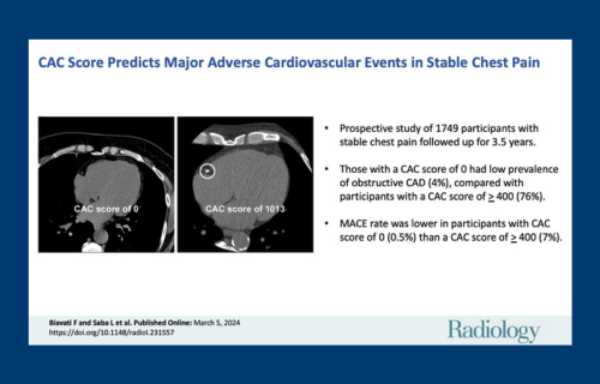 Coronary Artery Calcium Score Predicts Major Adverse Cardiovascular Events in Stable Chest Pain
Coronary Artery Calcium Score Predicts Major Adverse Cardiovascular Events in Stable Chest PainCoronary artery calcium (CAC) has prognostic value for major adverse cardiovascular events (MACE) in asymptomatic individuals, whereas its role in symptomatic patients is less clear.
To assess the prognostic value of CAC scoring for MACE in participants with stable chest pain initially referred for invasive coronary angiography (ICA).
This prespecified subgroup analysis from the Diagnostic Imaging Strategies for Patients With Stable Chest Pain and Intermediate Risk of Coronary Artery Disease (DISCHARGE) trial, conducted between October 2015 and April 2019 across 26 centers in 16 countries, focused on adult patients with stable chest pain referred for ICA. Participants were randomly assigned to undergo either ICA or coronary CT. CAC scores from noncontrast CT scans were categorized into low, intermediate, and high groups based on scores of 0, 1–399, and 400 or higher, respectively. The end point of the study was the occurrence of MACE (myocardial infarction, stroke, and cardiovascular death) over a median 3.5-year follow-up, analyzed using Cox proportional hazard regression tests.
The study involved 1749 participants (mean age, 60 years ± 10 [SD]; 992 female). The prevalence of obstructive coronary artery disease (CAD) at CT angiography rose from 4.1% (95% CI: 2.8, 5.8) in the CAC score 0 group to 76.1% (95% CI: 70.3, 81.2) in the CAC score 400 or higher group. Revascularization rates increased from 1.7% to 46.2% across the same groups (P < .001). The CAC score 0 group had a lower MACE risk (0.5%; HR, 0.08 [95% CI: 0.02, 0.30]; P < .001), as did the 1–399 CAC score group (1.9%; HR, 0.27 [95% CI: 0.13, 0.59]; P = .001), compared with the 400 or higher CAC score group (6.8%). No significant difference in MACE between sexes was observed (P = .68).
 Conclusion
ConclusionIn participants with stable chest pain initially referred for ICA, a CAC score of 0 showed very low risk of MACE, and higher CAC scores showed increasing risk of obstructive CAD, revascularization, and MACE at follow-up.
Congratulations to Prof Dodd and all involved in this research.
See published paper here.